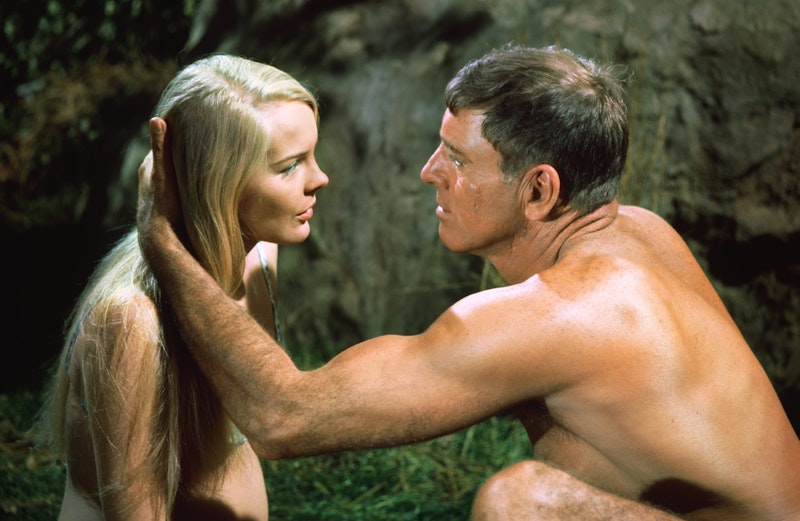He emerges from the wilderness, naked. Or close to it. Burt Lancaster’s aged, ruggedly muscular, leathery physique is both out of fitness magazines and born of decaying suburban desperation for life. His body’s as strange and contradictory a landscape as the one it inhabits—the wealthy nowhere of Connecticut, full of rolling hills, ancient stones, and garishly modern mansions equipped with swimming pools. He has an idea: why not swim home? Pool to pool, backyard to backyard, forming a river through the untraversable backwoods of private estates, forming a river the urban explorer will name after his wife, Lucinda. If this metaphorical river really is a metaphor, it might as well be for the River Styx, as The Swimmer (1968) is a purgatorial movie, ebbing and flowing from lost memories, missed connections, and regrets so deep that only fantasy can bury them.
Part of the magic of Frank Perry’s adaptation of John Cheever’s story of the same name is simultaneously specific yet disorienting spatial quality of film itself. Whereas Cheever’s narrative brings attention to the unreality of the space and time that Ned Merrill’s swim-across-the-county day exists in by contrasting an idealist’s viewpoint with a textured reality, Perry’s film is all about the subjectivity of basic filmic techniques: camera movement, editing, music, mise-en-scene. When Ned dives into his first pool at the start of the film, the orchestral music swells. It’s ecstatic. He emerges greeted by an icy, pre-made martini, complete with a lemon twist. A staple of mid-century, upper-class alcoholism. Everyone’s hungover, every house has a bar cart, the summer parties apparently are every day, and Ned Merrill feels refreshed, with old acquaintances commenting on his firm build and youthful vigor. He sees himself standing as a lone dreamer in a stodgy, suburban sea. Lancaster’s determination and fatherly charisma make his journey immediately convincing in a way the rest of the film works to undermine.
Wait, why did Burt Lancaster just run out of the forest in nothing but a bathing suit? Did he drive there? Is he leaving his car by swimming home? Don’t his bare feet hurt running over dirt, rocks, sticks, and gravel? Why do all of his neighbors act like they haven’t seen him in years?
It’s better to go into The Swimmer not knowing Cheever’s story. Not that Cheever answers any of the ambiguities—in fact, he revels in them even more than Perry—but because having any sense of orientation while viewing the film will be a disservice to the experience. The Swimmer is just so odd, so off-putting. There’s constantly a tension at hand between the film that Lancaster’s Ned Merrill thinks he’s in, and the real world that the characters inhabit. It’s an unmoored film, floating over the surface of something and never getting its footing. It might not even be fully intentional. Frank Perry was fired by the producers after principle, with Sydney Pollack taking over for reshoots. Pollack’s time behind the camera not only included altering scenes, but actors in them. One of the most climactic sequences, where Ned confronts an old mistress, used to feature Barbara Loden before she got replaced by Janice Rule in Pollack’s final version. Far from spoiling the final product, this behind-the-scenes unsettling serves to heighten the sun-poisoned, alcohol-detox atmosphere of The Swimmer.
The psychosis of The Swimmer is only broken in its final sequence. Or maybe it’s the other way around, and it fully gives into it amidst a shattering reality, like pretending the window is still there after a rock’s been thrown through it. Ned Merrill has swum home, and everything he’s told himself is a lie, but he can’t believe that. He has to keep lying to himself, even as people around him stop playing along; to do otherwise would be too terrifying.

